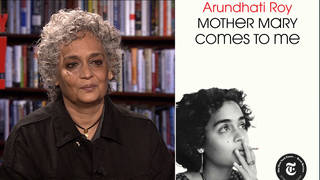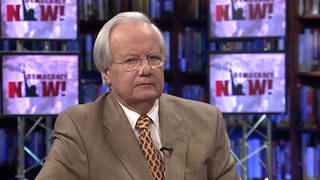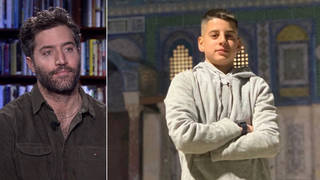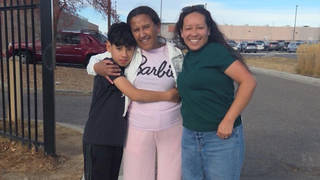
Guests
- Judith Butlerphilosopher, political commentator and gender studies scholar.
Part 2 of our conversation with professor and philosopher Judith Butler, whose name was recently shared by the University of California, Berkeley with the Trump administration in response to the administration’s sweeping crackdown on Palestinian solidarity activism.
Transcript
AMY GOODMAN: This is Democracy Now!, democracynow.org, The War and Peace Report. I’m Amy Goodman.
We continue with Part 2 of our conversation with Judith Butler, philosopher, political commentator and gender studies scholar. They’re a distinguished professor in the graduate school at the University of California, Berkeley, and the Hannah Arendt chair at the European Graduate School.
On Friday, the University of California, Berkeley said it had provided Trump officials with the names of at least 160 students, faculty and staff, complying with a federal investigation into alleged antisemitism on college campuses.
Professor Butler is also on the Academic Council of Jewish Voice for Peace. Their new article in The Chronicle of Higher Education is headlined “When Universities Become Informants: A practice from the McCarthy era makes an ugly return.”
Judith Butler, it’s great to have you with us in our New York studio. In Part 1 of our conversation, we got your reaction to your name being handed over to the Department of Education — I think it’s Office of Civil Rights.
JUDITH BUTLER: For Civil Rights, yeah.
AMY GOODMAN: For Civil Rights. And this was 160 students and staff and professors, you included. You got this on Friday. In fact, that was — in the letter, they told you — several weeks after they actually handed over your names. Can you talk about the significance of that period of time, and what it means that your university has handed over this number of names? The UC Office of the President said its campuses, quote, “routinely receive document requests in connection with government audits, compliance reviews, or investigations … and that UC and all public universities are subject to federal and state oversight.” But a spokesperson told the San Francisco Chronicle, quote, “UC is committed to protecting the privacy of our students, faculty, and staff to the greatest extent possible, while fulfilling its legal obligations.” Your response?
JUDITH BUTLER: Well, it may have legal obligations. Of course, it does have legal obligations to comply with the Department of Education when it seeks to know whether it is complying with Title VI. And in this case, they wanted to know whether the UC campuses, in general, all the campuses, were complying with Title VI, and in particular —
AMY GOODMAN: Title VI being?
JUDITH BUTLER: Title VI being the policy against discrimination, that is adopted — that the government has formulated and which is imposed on all those who receive federal funds from the government. So, but Title VI was meant to protect against discrimination, racial discrimination, discrimination on the basis of nationality and religion. It was an important civil rights achievement. But in this — but it also, let me just add, Title VI provides for those accused of infractions, you know, those accused of racism or antisemitism or discrimination of some kind, to be apprised of the allegation, to be able to defend themselves and to be able to go through a bona fide review, where their own point of view and counterevidence can be presented. None of that happened here. So, even though the government thinks it’s monitoring Title VI, the way in which it’s doing it is, in fact, destroying some of the provisions guaranteed by Title VI. All of us accused have a right to know what the accusation is, to be able to rebut, to give our own point of view, to produce counterevidence and the like, and to go through a procedure where we’re apprised of what’s going on.
So, the fact is that all of the University of California campuses gave names. UC Berkeley is the only campus that informed those whose names were sent forward that our names were sent forward. So, we were apprised of that. We were not apprised of what the allegation is. We were given no opportunity to refute them or provide counterevidence, of course. But we do not know the number of people in the University of California communities, all of the campuses, whose names are in files where there’s an allegation of antisemitism. It could be a thousand. It could be more than a thousand. It’s 160 at UC Berkeley. What is it at UCLA? I don’t know.
AMY GOODMAN: So, Judith Butler, yours is one of the names. In Part 1 of our discussion, you particularly talked about your concern not for yourself —
JUDITH BUTLER: Right.
AMY GOODMAN: — but especially international students —
JUDITH BUTLER: Yes.
AMY GOODMAN: — whose names may have been turned over, because they could lose their visas —
JUDITH BUTLER: Yes.
AMY GOODMAN: — or, worse, detained, etc. You are — in addition to being a philosopher, gender studies scholar, distinguished professor at the graduate school at University of California, Berkeley, you are the Hannah Arendt chair at the European Graduate School. Explain who Hannah Arendt is and how you think she would have responded, a refugee from the Holocaust, who actually was at Berkeley, who was a professor there.
JUDITH BUTLER: Well, she was briefly there. That’s true. She got into good fights with people there.
Hannah Arendt wrote a really important article called “Moral Responsibility Under Dictatorship.” And she points out that all of the officials who are asked to implement, in that case, dictatorial policies, but we could say fascist policies or authoritarian policies — all the officials who are asked to implement are reproducing and intensifying fascism, intensifying authoritarianism.
So, when I asked the legal counsel at UC Berkeley, “Why did you comply?” he said to me, quite clearly, “This is my job.” And I thought to myself, “You have not read Hannah Arendt.” I said, “Did it ever occur to you not to comply?” “No.” “Did you know that other people have not complied?” He said, “No, I’m not aware of that.” So, in fact, we get compliance from the University of California president’s office with an absolutely treacherous demand on the part of the Department of Education, and then everyone down the line, all the legal counsels who know better, who actually know better, that this is a deep abrogation of basic rights, comply, produce the lists and send off those files.
Now, I will say that maybe that they made some decisions in how best to comply, and I note that many activists on the Berkeley campus and elsewhere are not included in those files, so I don’t know how they made those decisions. But they should have said no. And Hannah Arendt blamed Eichmann, for instance, in her book on the Eichmann trial, for being a cog in the wheel and for not exercising what she calls judgment, like, “Do I comply? Do I not comply? Am I being asked to break the law? Am I being asked to abide by or conform to a law that is unjust? And if I see it as unjust, I must oppose it as unjust and be disobedient, and take the consequences.” But what lawyer, who in the legal counsel’s — the legal counsel offices of all the University of California campuses, who stood up and said, “This is unjust. I am willing to lose my job. I will not implement this”? No one. As far as I know, no one.
AMY GOODMAN: It’s been interesting seeing Columbia University’s acquiescence to the administration, and Harvard University’s opposing the administration, and a federal judge, Allison Burroughs, just ruling that the Trump administration can’t cut off billions of dollars in research funding to Harvard, saying that Harvard was using antisemitism as a smokescreen. You’re a Jewish professor. You’re an adviser to Jewish Voice for Peace. A significant percentage of the protesters across the country this past year around Israel’s assault on Gaza have been Jewish. And yet you are being targeted.
JUDITH BUTLER: Well, I understand that it’s my political speech that’s being targeted. I’ve never uttered anything that’s antisemitic. But if you accept the IHRA definition, the International Holocaust Remembrance Association, their definition of “antisemitism,” then anytime you make a strong criticism of the state of Israel, you are eligible for the allegation of antisemitism. So, their definition of “antisemitism” is way overbroad, right? It includes all kinds of political speech that should be protected under the First Amendment. And I’m openly critical of the state of Israel. I’ve been calling this a genocide from early on. I did so on your show a year and a half ago.
But I think that, in fact, we have two different issues here. One, a system like the University of California is dependent on federal funding, and it doesn’t want to lose that funding, and it sees the threat made against everyone else, and itself has received a threat, if it’s not compliant with this investigation, it will — it will, very possibly, be deprived of federal funding. At the same time, it has to accept the equation of political speech against genocide as antisemitic. It has to accept that and patrol for it and enforce it. So, we have both the fear of losing money, on the one hand, and a complicity with the U.S. support for the genocidal conditions and ongoing practices in Gaza.
AMY GOODMAN: Your campus, for our global audience, is very significant, the University of California, Berkeley, as The Guardian notes, and that you talked about, that UC Berkeley is home to the free speech movement in the '60s. You've said, “We’ve been a place where controversial public issues can be freely debated. We have different views on Israel-Palestine. We need to hear them even when they upset us. That’s the spirit of the place that I have been championing and affirming for 30 years. So it’s a heartbreak and it’s disgraceful.”
JUDITH BUTLER: Yes, it is. And it’s the students who’ve been out there making clear their opposition to the University of California’s investment in companies that serve the occupation and the genocide against Palestinians. And it is — it is their rights of free speech that are being demonized and criminalized at this moment. Those students are the brave ones who are actually carrying the tradition of Berkeley free speech forward into the future. We should be applauding them. We should not be criminalizing them.
AMY GOODMAN: As a gender studies professor, you are author of the book Who’s Afraid of Gender? Can you talk about how the trans community has become a political target of the right? You write, “Why is freedom so frightening? Is that even the question? Or is rather: How has freedom been made to seem so frightening that people find themselves longing for authoritarian rule?” What do you mean by this, Professor Butler?
JUDITH BUTLER: Well, I do think that the rise of authoritarian powers in different parts of the world, and we can think about the Bolsonaro regime — I gather he’s going to jail; I think that’s a good idea; I’m an abolitionist, but I think that’s a good idea — Orbán, especially, in Hungary; Milei, who’s rolling back progressive gender legislation in Argentina; but also Trump — these authoritarian figures — Erdoğan, clearly, in Turkey — they have all been anti-gender. They want to restore the family to its classical model. They want marriage to be restricted to heterosexuals. They want — they want rights for trans people to gain access to healthcare and have their legal status changed to be rolled back. And they and their patriarchal aims, their patriarchal fantasies about the future and about their own place in it, demand that we return to a notion of biological sex as determining who we are. And they have certain ideas of what biological sex might be, which are very controversial, but at least the sex assigned at birth. And they’re also obviously trying to keep the family in place as heteronormative as part of the building of nationalism. So, for instance, you know, Orbán is also against miscegenation. He’s afraid that women will start reproducing with refugees, and he doesn’t want to see his country darkened in that way.
But, look, the main point, I would say, here is that the rights-stripping activity that’s happening against trans people, being deprived of legal status, of healthcare, of safety, of anti-discrimination protections, that rights stripping is happening across the board. Right? We need to think about that rights stripping in terms of what’s happening with students when they’re being deported, what’s — their rights are also being stripped — what’s happening to people who are losing their jobs because they made use of constitutionally protected political expression. There are constitutional rights, there are international rights that are being destroyed across the board, which is one reason why the movement for trans rights should be linked with all of our other political movements, because we’re seeing rights stripping across the board, which is, of course, a major tactic of authoritarian powers.
AMY GOODMAN: And you have the horror of the assassination of Charlie Kirk last week, who was at the Utah campus. And at the moment that he was shot dead, he was being questioned by, it turns out, a young man very similar to him — he had a wife and two kids — but he was very opposed to Charlie Kirk, and he got to the front, and he had a chance to question him. And he was asking about trans mass shooters and how they compare to the number of mass shooters overall, at which point Charlie Kirk was shot. How this has become such a central issue of the right’s attack on progressivism in the United States? Your final thoughts?
JUDITH BUTLER: Yes, well, I think the right, the Christian right especially, has produced two kinds of specters. One is trans. The other one is the migrant. And they both — they both hit at very intimate issues of family, of sexuality, of association. They bring racism together with transphobia, anti-feminism, as well. And, you know, there was that meme that was circulated by Elon Musk, apparently: If Kamala Harris were elected, she would perform trans surgeries on migrants. And, of course, it was completely fictitious, but it was a very exciting lie for a lot of people. It’s like, “Yes, that’s not the world we want: trans surgeries.” You know, people are afraid their kids will come home from college with trans surgeries or, you know, that they’ll be somehow subject to an ideology.
But trans emancipation, trans struggles are about freedom, are about being able to live and breathe in the world without fear of violence, the rights that we owe for new migrants in this country. They also should be able to live and breathe without fear of violence and discrimination. They should all be given the healthcare they need. They should all be given the rights to shelter that they need. That the most vulnerable communities are demonized, we know this from the history of fascism. It’s happening again, and that they get melded together, and crazy fantasies about both communities excite hatred, and then that gets exploited by our right-wing fascists to their own ends. So we need to fight that with — not just with strong arguments, but with really compelling visions.
AMY GOODMAN: Well, I want to thank you so much for being with us, Judith Butler, philosopher, political commentator, gender studies scholar, distinguished professor in the graduate school at University of California, Berkeley and the Hannah Arendt chair at the European Graduate School. They’re on the Academic Council of Jewish Voice for Peace. Professor Butler is the author of numerous books, most recently, Who’s Afraid of Gender? We’ll link to their new piece in The Chronicle of Higher Education, headlined “When Universities Become Informants: A practice from the McCarthy era makes an ugly return.” To see Part 1 of our discussion, go to democracynow.org. I’m Amy Goodman. Thanks so much for joining us.












Media Options